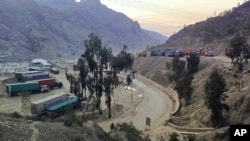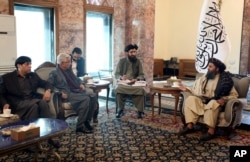Taliban authorities in Afghanistan said Thursday they had reopened a busy border crossing with Pakistan after four days of closure that saw thousands of travelers and trade convoys, with many carrying food items, stranded on either side.
Pakistani officials said, without elaborating, they were still completing “administrative requirements” to restore all movements through the Torkham point of transit.
The reopening came a day after a high-level Pakistani delegation visited the Afghan capital, Kabul, to discuss border security, counterterrorism, and economic cooperation with the Taliban leaders of the neighboring landlocked country.
Torkham, one of several crossings on the nearly 2,600-kilometer frontier separating the two countries, was closed by the Taliban on Sunday, accusing Pakistani immigration authorities of “misbehaving” with Afghan travelers, including those seeking medical care in Pakistan.
Officials in Islamabad rejected the charges, maintaining their tightening of border controls was meant to counter unlawful entrants linked to the banned Pakistani Taliban, commonly referred to as TTP, waging terrorist attacks in Pakistan out of Afghan sanctuaries.
The Pakistani delegation, led by Defense Minister Khawaja Asif, shared “irrefutable" evidence with Taliban interlocutors in the talks about the presence and activities of TTP leaders in Afghanistan, sources told VOA.
The Pakistani side demanded the Taliban take “practical steps” to stop the militant activity on Afghan soil in line with their counterterrorism assurances to the world. They also cautioned a lack of action against TTP could force Islamabad to further reduce its diplomatic presence in Kabul besides tightening border security measures.
Pakistan evacuated its chief diplomat in Afghanistan in December after he narrowly survived a gun attack while walking in his sprawling Kabul embassy compound. That shooting was claimed by the Afghan affiliate of the Islamic State terrorist group, known as Islamic State-Khorasan Province however.
Sources described Wednesday's discussions in Kabul as productive and said, without elaborating, the Taliban also shared details of some of their actions against TTP and promised to do more.
A post-meeting formal Pakistani statement suggested terrorism and security matters had figured high in the talks.
“Matters relating to the growing threat of terrorism in the region, particularly by TTP and ISKP came under discussion. The two sides agreed to collaborate to effectively address the threat of terrorism posed by various entities and organizations,” said the statement, referring to the regional Islamic State branch.
“Both sides agreed to strengthen bilateral cooperation in various fields to further enhance the fraternal relations between the two countries,” the statement concluded.
Taliban government spokesman Zabihullah Mujahid said the two sides had held detailed discussions, covering, among other issues, "security concerns” and “activities of armed opposition groups." He did not elaborate on nor mention TTP in his statement.
Mujahid said their deputy prime minister, Mullah Abdul Ghani Baradar, led his side in the talks where the foreign minister, Taliban spy chief, the defense, and the interior ministers assisted him.
TTP, designated a global terrorist group by the United States, is a Pakistani offshoot and a close ally of the Afghan Taliban. It provided recruits and shelter on Pakistani soil to the Taliban while they waged a deadly insurgency against U.S.-led NATO troops in Afghanistan for almost 20 years. The Taliban stormed back to power in August 2021 as foreign forces withdrew from the country.
Pakistan says TTP leaders and commanders, who have long taken refuge in Afghanistan, have benefited from greater freedom and mobility for plotting cross-border terrorism since the Taliban reclaimed power in Kabul 18 months ago.
Hundreds of Pakistanis, mostly security forces, have in recent months been killed by TTP-claimed suicide bombings and other terrorist attacks.
Late last month, a powerful mosque bombing in the northwestern Pakistani city of Peshawar killed nearly 100 people, mostly police officers.
No foreign country, including Pakistan, has formally recognized the Taliban government in Afghanistan, citing human rights and terrorism concerns.
However, Islamabad has recently stepped up economic and trade cooperation with Kabul, enabling the cash-strapped Taliban administration to generate much-need revenues through bilateral and transit trade using Pakistani land and seaports.








